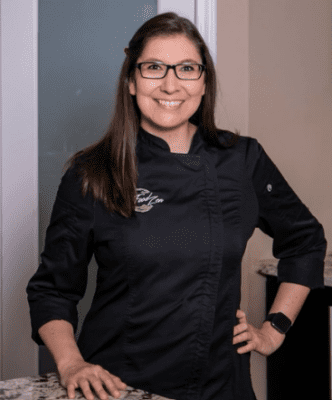
Name: Destiny Moser
Location: Kitchener, Ontario
Education/background: Honours – Specialist Chef, Liaison College
Business name (if applicable): FoodZen
Tribal affiliation: Ojibwe part of the Rainy River First Nations
What led to your passion for indigenous foods?
Here’s a bit of background: my mom was part of the Sixties Scoop, taken from her community at 4 years old and placed in foster care. At 6, she was adopted by a German farming family in Waterloo Region, where I was born. As I delved into my Indigenous roots, I noticed a gap in the availability of Indigenous foods. Many of these foods are labeled exotic, illegal, or specialty, making them hard to access and afford, especially for urban Indigenous people.
After 17 years in the corporate tech world, I decided to leave and pursue my passion for food. Shortly after, my mom passed away, and the discovery of unmarked graves at residential schools began. I felt a profound sense that I needed to do something bigger, to highlight Indigenous food in Canada. This journey has become a path to healing and reconciliation for my mom, for myself, and to prevent future generational trauma for my kids.
Why do you think it’s important to make traditional foods accessible for Natives?
Traditional Indigenous foods are often misunderstood; they go far beyond Bannock and Indian tacos. Indigenous foods are deeply connected to the local land, community, and sustainable seasonal harvesting and foraging practices. Indigenous cuisines are being reclaimed and are gaining renewed awareness and popularity. They also hold deep connections to Indigenous languages, knowledge, and cultural practices.
What is the importance of an indigenous diet for a healthy lifestyle?
Before the arrival of settlers and the introduction of highly processed food, like Bannock, Indigenous people rarely experienced diabetes, heart disease, and many other health issues that are prevalent today. The increase in processed foods in our diets has led to Indigenous people having the highest rates of diabetes in Canada.
By embracing Indigenous philosophies from farm-to-table, and choosing hyper-local, ultra-seasonal, and sustainably produced ingredients, we can improve our overall health, bring us back to our connection with the land and improve our environment. This approach is beneficial not just for Indigenous people, but for everyone.
What ways are you involved in the education, restoration and accessibility of traditional Native foods?
At FoodZen, while we cook international foods, we are dedicated to following Indigenous philosophies of hyper-local and ultra-seasonal ingredients. We collaborate with local farmers and vendors who share our values and practice sustainability. Additionally, I teach in schools and organizations about Indigenous foods and food sovereignty. Our goal is to transform the way people perceive, purchase, and consume food.
I have been actively advocating for the removal of the word “exotic” from our meats, such as venison and bison. Technically, pigs, cows, and chickens are exotic. If the animals are farm-raised and native to Canada, calling them exotic doesn’t make sense.
How can community members be involved and support the cause of restoring and protecting indigenous food systems?
Buy hyper-local, ultra-seasonal ingredients and consume more foods that are Indigenous to the Americas. Research where your food is coming from and what practices they follow for sustainability. Write to your local groceries and ask for more Indigenous ingredients like Canadian Sunflower oil, pure wild rice, Canadian sumac, juniper, etc. Write to your elected officials and leaders, and ask them to remove the label exotic from our meats. Think about how what we do today will impact or improve the next 7 generations.
